Back in the 1980s, Anthony Michael Hall was everyoneís nerdy younger
brother. He first caught our eye as young son Rusty Griswold in the
classic comedy National Lampoonís Vacation. That movie was
written by a relatively unknown screenwriter named John Hughes.
Hall quickly became Hughesí acting surrogate as the writer made the leap
to directing, creating autobiographical characters for Hall
to play in the legendary comedies Sixteen Candles, The
Breakfast Club and Weird Science. Quickly Hall was a charter
member of 80s elite youth actors Ė the so-called Brat Pack. No less
than legendary director Stanley Kubrick compared Hughes and Hallís work
together with that of Frank Capra and Jimmy Stewart.
However, personal problems and some bad film choices derailed Hallís
career in the 1990s. By the new millennium he was all grown up and
becoming a respected character actor when stardom beckoned again. Hall
became one of the pioneers of cable TV series, taking the lead in a show
based on the Stephen King novel The Dead Zone (which had also
been made into a movie in 1983 with Christopher Walken.) Starting soon
after Michael Chiklisí The Shield, The Dead Zone became a
surprisingly popular series and lasted six seasons before they decided
to wrap the show up.
However, when one door closes others open, and Hall is following his
long stint on television with a role in Christopher Nolanís highly
anticipated Batman sequel The Dark Knight. Hall is also
in the early phases of making his feature film directing debut.
The week that the final season of The Dead
Zone was being released on DVD, Hall was nice enough to sit down
with us and discuss his series and his career.
Youíve been acting
since you were a small child. How did you first get into it?
When I was a kid I did a play. I had the opportunity to meet Mr. Steve
Allen Ė the late, great Steve Allen. I did a play that was actually
kind of a semi-autobiographical play he had written about a day in his
life during the Depression Ė when he was a little boy. It was a drama
about this family reunion. That was an incredible meeting. I had the
opportunity to audition for him. I was eight years old. I got the
part. So Iím very proud to say that I think that Steve Allen gave me my
first break in this business, considering the legendary work he did in
his lifetime. It was called The Wake. 1976, I think. Wow. Iím
forty now, so that was thirty-two years ago. (laughs)
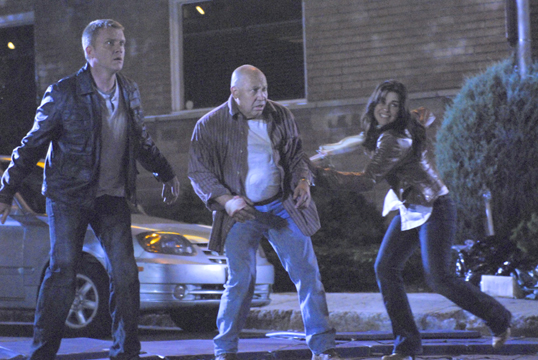 You
starred in two movies that could legitimately be considered as defining
their generation Ė
Sixteen Candles
and
The
Breakfast Club. What is it like to be a part of them? Also, at the
time you were making them,
did you ever have any
idea that they would become as beloved as they did?
You
starred in two movies that could legitimately be considered as defining
their generation Ė
Sixteen Candles
and
The
Breakfast Club. What is it like to be a part of them? Also, at the
time you were making them,
did you ever have any
idea that they would become as beloved as they did?
I really did not. None of us really did. It was so funny; I was at the
AFI Tribute to Warren Beatty last night. I was chatting with Molly and
her husband and she was showing me pictures of her daughter. I was
going: This is surreal. First of all to put it in context Ė itís just
amazing that 25 years have gone by. No, I didnít think these movies
would have the impact that they did. They meant more to me than I could
probably really express, because obviously that they found such a life
on video and television. The fact that they are beloved Ė I feel so
fortunate, Jay, because most actors if they are blessed, they will have
one or two projects. I have a handful of movies that people just love
and watch year round. The way thatís edified me, it fed me as a
person. Especially the years where I couldnít get work, believe me it
meant the world to me. I always tip my hat to John Hughes and
Universal, because, you know, I was a punk little skinny kid. But John
Hughes saw something in me. It got my career started. So it was
amazing.
As a younger actor
you did mostly comic roles, now you tend to do more drama. Which do you
prefer and which one is harder for you?
I have to say, there is a great truth to this idea that playing bad guys
is more fun. I [recently] did this move with Dean Cain and I had such a
good time. It was this movie for Hallmark [called Final Approach].
It kind of felt like his 24, heís playing Jack Bender Ė it even
sounded like Jack Bauer. (laughs) My point is, playing a bad
guy is a lot of fun. Doing comedies are great, too. I havenít made a
comedy in so long, but I would love to.
I hear that you were
pegged for the role in
The Dead Zone
after the creator saw you playing Bill Gates in a TV movie. Is that
true?
It is, actually. Michael Piller, who is not with us anymore, is the man
responsible for me being in The Dead Zone, completely. He just
gave me such an opportunity. That is in fact the case. Apparently he
did see Pirates of Silicon Valley, which led to me having the
series and reinvent myself. If I had two guardian angels in the
business, certainly John Hughes would be one of them and Michael Piller
would definitely be another.
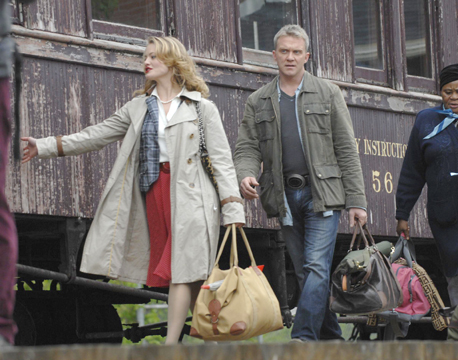 Other
than your brief stint on
Saturday Night
Live, The Dead
Zone was your first experience with series television. How is series
work different and do you prefer it to working on movies?
Other
than your brief stint on
Saturday Night
Live, The Dead
Zone was your first experience with series television. How is series
work different and do you prefer it to working on movies?
Itís really the same application. One of the things that I had my mind
is that when I started this was Iím just going to treat this like Iím
making a movie every week. Thatís really what it became, Jay. Weíre
doing 60-page scripts every six or seven days. Weíre shooting on
location. It really is like making a movie. (laughs) So I
think that was an amazing experience. The years went quickly, you
know? Some seasons weíd do thirteen episodes. Some seasons theyíd
order more. It was just an incredible experience. Iím actually in the
process of prepping a film that Iím going to direct and that I got
financed. Iím going to start making the film in the fall. But to
answer your question, I always approached it like I was making a movie
anyway. Having done 80 episodes, if you look at everyÖ sort of like 45
to one power episode, it would be sort of like 40 movies of one thing.
It was a great experience. I had so much opportunity, playing other
characters, with all these different storylines. It was just an
incredible, rich experience as an actor.
Legendary actor
Christopher Walken had played the character of Johnny before you did.
Did you see his version of the story before doing the series?
Absolutely. Absolutely.
How important was it to you to try to differentiate your take on
the character from his?
Absolutely, because you know if one young Ė any age actor Ė does an
impression of Chris Walken, weíve heard a thousand, right?
I just esteem the guy up there like I think the rest of the
country would Jack Nicholson. Heís one of our great actors. Iím
certainly not going to imitate him or try to do that. I just wanted to
try to take it in my own direction. The two things that I did take were
the pea coat and the cane. Then I wound up being stuck with that cane
for about four seasons. (laughs) I donít know how good an idea
it was. I had no pressure on myself to fill his shoes or anything like
that. Like I said, thatís like someone trying to imitate Jack
Nicholson. Itís just not going to work.
Were you a fan of
Stephen Kingís writing before hooking up with the show?
Yes, I was, but I have to admit Iím not a big fan of novels. Iím not a
big novel reader. But I went back and read The Dead Zone. I
loved The Shining, certain projects that have been adapted.
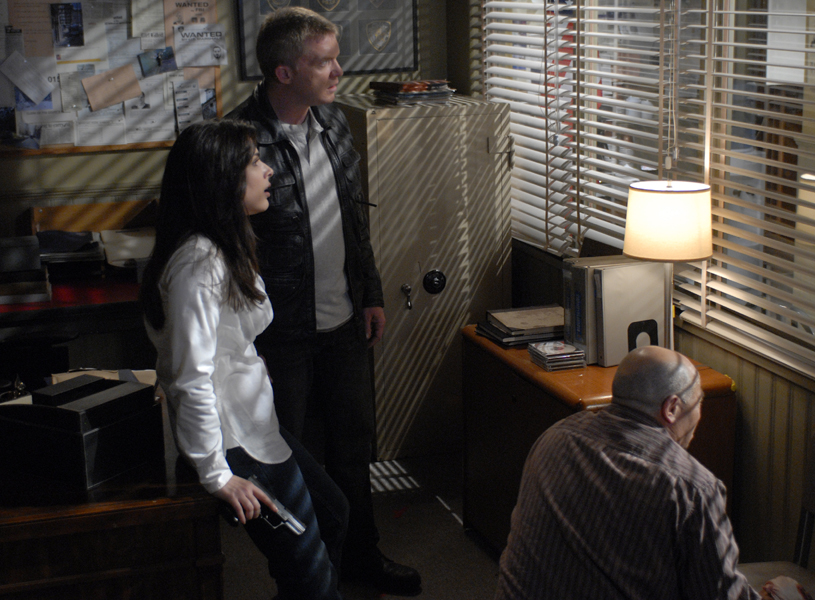 I
believe he wasnít directly involved with the show. Did you ever hear
what he thought of the series?
I
believe he wasnít directly involved with the show. Did you ever hear
what he thought of the series?
Yes. You know where I found out? This is really odd. I ran into his
nephew outside a Red Sox game. This is about two summers ago. He said,
ĎIím Stephen Kingís nephew.í I said: what does he think of the show?
ĎHe loves it.í So I did get confirmation of that. I thought it was
kind of cool.
The show has shown
the positives and negatives of Johnnyís powers over the years. Given a
choice, do you ever think that having the ability to see into peopleís
secrets and futures would be worth it?
(laughs)
Interesting, right? Yeah, I mean, absolutely. Would it be worth it?
Yeah. I know Iíve been asked this, Ďwould I want this ability?í It
would certainly be a mixed bag. (laughs) I donít think I should
answer, but, yeah.
In recent years Ė and
the
Dead Zone is a pioneer in this Ė cable series have become more and
more popular and edgy as compared to the major networks. Why do you
think that so many film actors like yourself and Glenn Close, Denis
Leary, Holly Hunter, Michael Chiklis, Tony Shalhoub and Kyra Sedgwick
have moved into cable series?
Well, because of the opportunities, number one. Weíre actors and
craftspeople, just like anyone on a crew. We need to work, number one,
I would say. But as you said, I think with satellite and all these
different channels opening up, thereís just so much potential. I think
what happened about five seasons ago when our show was introduced Ė it
was right after The Shield was starting to take off Ė is that
there was an industry, as you know, Jay, where the networks started
figuring out that people arenít sitting on their ass in the summer.
Theyíre watching new cable shows that would be on in the summer as
opposed to watching reruns of what the network would offer. It created
a sort of counterspin and the networks realized that they had to
actually program twelve months a year Ė not eight months or nine months
a year. Being a part of that transition was great. Because of cable
we had the good fortune of having a longer run and also a less
meddlesome relationship with the network. They really trusted us to do
the show that we could do Ė that we could deliver. It was also based on
Michaelís track record and everything. We were very fortunate to have a
nice, loose set of parameters. We were able to try different types of
shows and at the same time, with a smaller audience, satisfy our needs
for our advertisers and stay on the air. It was really serendipitous.
It was very fortunate, obviously, because as you know, most shows donít
last a year.
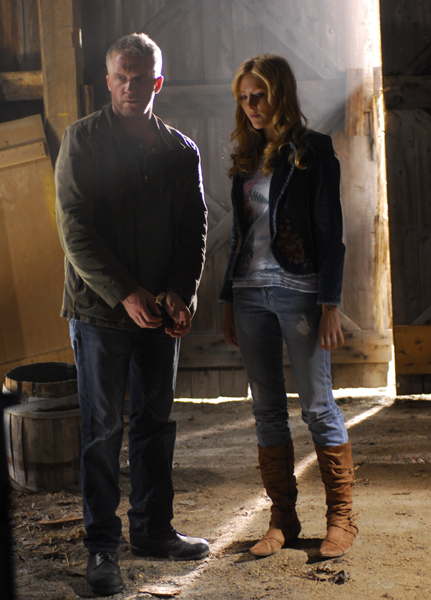 The
series lasted six years and 80 episodes. Are there any episodes that
stand out for you as particular favorites?
The
series lasted six years and 80 episodes. Are there any episodes that
stand out for you as particular favorites?
I like the hardcore-hitting dramatic ones. I favor the episodes where
my character is doing detective work, because as an actor it sort of
allows you to go from point A to point B and kind of focus your energy Ė
what youíre doing scene by scene. There was one that I did called
ĎBabyloní which I thought was very powerful. It was about Johnny
finding out about his father. That was a couple of seasons back.
Thereís one I directed called ĎThe Cold, Hard Truthí which Richard Lewis
guest starred in. That was just a joy, because I see Richard Ė he
played this sort of Howard Stern/Lenny Bruce type shock jock. Thatís
kind of who he is anyway. So that stood out, too. I had such a great
time being able to direct him. When you work with great talent like
him, you just kind of get out of the way and let them fly.
The Dead Zone
lasted
six seasons. How tough is it to say goodbye?
Oh, man. You know what, it just changed my life and it really was just
difficult. It was difficult leaving Vancouver after six seasons. It
was difficult to bring it to an end. But, Iíll leave you with thisÖ it
was a great quote of Tom Skerrittís. Invariably Iíd always be
interviewing like Lou Gossett, Jr. or somebodyÖ just asking questions in
the week I could spend with whatever actors. With Skerritt, I asked him:
Who are some of your favorite directors? He said, ĎYou know, Mike,
after a while the shows all kind of bleed together. Itís the people and
the places, you know?í When he said that [and] even right now, I get a
goose bump, because it was such a poignant way of saying it. Thatís
what itís all about. I loved being in Vancouver. I loved all the
people I got to work with. I was afforded this wonderful opportunity to
carry a show. I hope I did my job and toed the mark. But, itís the
experience of being in that place and working with all those people and
knowing they were there to support me. It just made me want to work
that much harder. And we did. Iíd work six day weeks. On a TV show
like that, people donít realize but youíre putting in 12-14 hour days.
Itís like a double shift compared to a normal personís schedule. Itís a
great time commitment. Itís not a clichť, but itís that real true
notion of you spend more time at work than at home, so you better enjoy
your work. (laughs) I had a
great time. I had a great time. Changed my life.
You recently did a
cameo as yourself on
Entourage.
Was that fun?
Oh man, that was fun, Jay. I was honored. I grew up with Kevin
Dillon. I know the Dillons for years. Iím happy with his success. I
was thrilled. Iím a big fan of that show. I was so psyched that they
wanted me to come on as myself. It was such a kudo, because as you know
the cameos that are built into that show make it great. But that show
is just funny. Iím all for mocking Hollywood. I donít think there are
enough shows [that do]. I think we need more shows like Entourage.
(laughs)
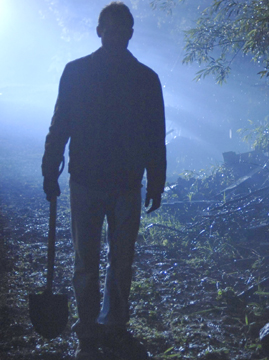 I
see youíre going to be in
The Dark Knight. I know everyone is sworn to secrecy on the plot, but
what was the experience of making it like?
I
see youíre going to be in
The Dark Knight. I know everyone is sworn to secrecy on the plot, but
what was the experience of making it like?
Yeah, itís great. What I found out, Jay, I didnít know this Ė
apparently that was an old reference to Batman. He was always referred
to as the Dark Knight, which was news to me. I thought Nolan had
invented that idea. You know what, just in keeping with the year that I
had, my year began Jay: I went and did the Entourage here in LA,
then I moved to Montreal for six months and shot my final season and
then I drove across country in my Porsche and I went to Chicago to begin
work with Batman. I got to work with Gary Oldman. I just had a
wonderful time with him. To me heís a modern day Olivier. I love the
guy. Christian Bale couldnít have been nicer. It was a great
experience. I did about three weeks of work on that. Then I went to
London. In terms of storyline, basically the Joker takes Gotham. I got
to the set Ė just to speak to Heathís memory, I mean this is a great
young actor. I heard from everybody that he was just tearing it up on
set. Then I got to work with him. I did a scene with Heath that Chris
actually wanted Heath to direct on video. So we shot a scene on video
that Heath directed that will probably be incorporated into the film. I
got time to hang out with Heath and we were shooting at Cardington,
which is actually where they built Ė not the Hindenburg Ė but all the
zeppelins. It was a former airfield outside of London. We were
shooting at this huge stage there. We had a lot of time to ourselves,
just goofing off and hanging out, waiting to go on. I had a nice
experience with Heath and heíll certainly be greatly missed. He was a
gifted actor and he was a really cool guy, too. He was really down to
earth.
Could you tell me a
little more about your directing project?
I canít really speak to it yet. I can tell you this, the film has been
financed and weíre moving ahead. Basically, Iím starting a company.
Iíve been working on it with my father for the last couple of years.
Our company is Manhattan Films and I am more excited about this than
anything. I canít really reveal too much about the storyline, yet, but
I am going to direct it and I am going to star in it. Iím really
excited about it. Weíre making the movie in Miami.
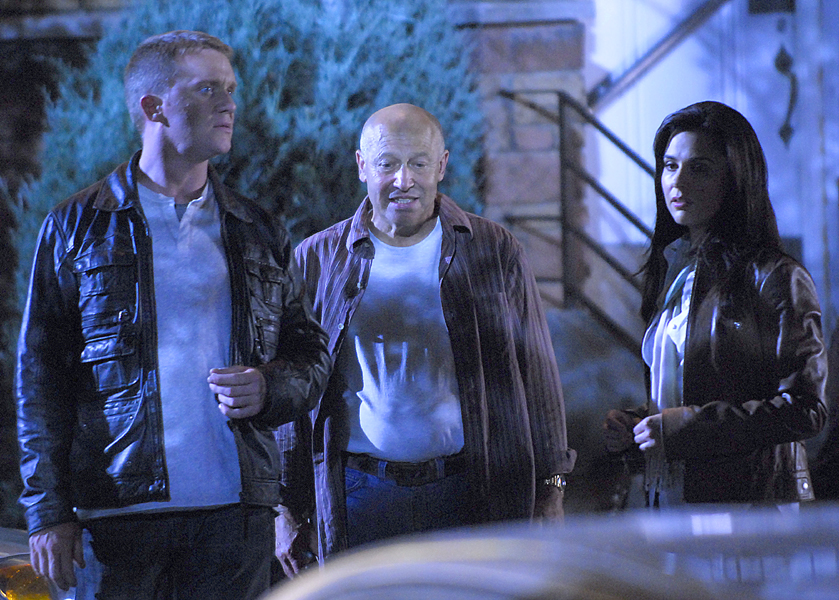 Is
directing something youíre looking to do more of? I know youíve also
been producing stuff.
Is
directing something youíre looking to do more of? I know youíve also
been producing stuff.
Yeah, absolutely. I produced a couple of independents Ė things that I
have acted in as well. Iím a student of the great filmmakers. I really
do want to become a filmmaker. It just feels intertwined with my
destiny. I really feel like itís going to happen. This is going to be
wonderful. Itís basically going to be a year of my life. Iíve got to
tell you, a major influence was this last experience, working with
Nolan, Jay. To be on the set with him and watching him and Wally
Pfister, his DP [Director of Photography], lens the film. Iíve been
following directors around all my life, but when you work with a great
one, you know. This guy had amazing focus. Chris really pushed me over
the top. He doesnít even know this, but in the last year, it really
activated me. I was able to secure financing on something that I
optioned and weíre going to make the film in Miami in the fall. Iím
just so thrilled.
How would you like
for people to look at your career?
Wow, thatís an interesting question. The old life review. (laughs)
You know what, I think as goofy as it sounds, ever since I was a kid I
always just wanted to do some great things. Iíve always wanted to be a
part of some great things. Iíve been so richly blessed, man, to have
this career and to have done it already. To have been a part of things
that people love. I think that has fed me in a way that really kind of
renews me. It makes me want to keep rising and doing better work. Iíve
already been able to experience the joy of having an effect on an
audience Ė on the scale that I have in movies growing up. That really
has completely informed why I do want to become a filmmaker. I love the
business more than ever. I have a great respect for people like Ron
Howard or even Clooney or even Sean Pennís work as a director. Itís the
final frontier. (laughs)
Are there any
misconceptions youíd like to clear up?
Well, yeah. I was not fired by Stanley Kubrick on Full Metal
Jacket. Iíve had to address this for years.
Yeah, I saw that said
on the internet when I was researching this storyÖ
I can tell you this. I can look back andÖ although I didnít wind up
making the film, I saw Matthew Modine about a year after he wrapped it
with him and I said how long did you shoot on that movie? He said, í54
weeks.í Kubrick shot for a year and two weeks. Well, you know, heís
one of my favorite filmmakers. To have been afforded the opportunity
even to have spoken to him, you know? At that time, Kelly LeBrock [who
co-starred with Hall in Weird Science], who is still a friend to
this day, she was friends with Jack and she took me up to Jackís house
to discuss working with Kubrick. So the fact that I got to meet Jack
and that Iíd had conversations with Mr. Kubrick before he left us Ė
thatís what I hold onto. I brought that up because that also Ė like the
inspiration I got from Nolan Ė to have as a kid come across a great
master of our industry like KubrickÖ. He said things to me which are
freaky private that really blew my mind. Itís interesting, Jay. Having
been at the AFI Tribute for Warren Beatty last nightÖ and these things
are aired by USA, and Iíve gone to a bunch in the last few yearsÖ but
Iíve got to tell you this. Itís amazing what a goose bump moment that I
get when I attend these events. Itís a reminder, I think, to work with
reverence for what we do and how it affects people. It is almost
religious to me. (laughs) Being at events like last night, or
even when I go on a studio lot, I realize: wow, Iím a part of this,
man. Hollywood is something that feeds the world. Dreams are spun in
Hollywood. I just feel really fortunate to have been a part of things
that have affected people. At the end of the day, itís make believe for
a living. But I feel very fortunate. I think all of these experiences,
whether itís working with Nolan or having the privilege of speaking with
Stanley Kubrick as a young man; all these things have formed and affect
who I will become from now on.
Features Return to the features page